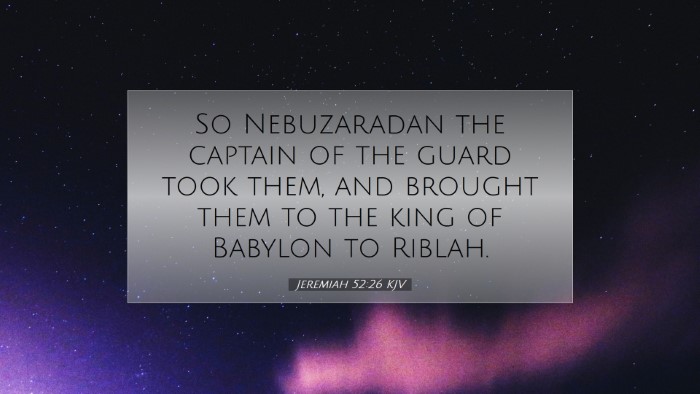Commentary on Jeremiah 52:26
Verse Reference: Jeremiah 52:26 - "So Nebuzaradan the captain of the guard took them, and brought them to the king of Babylon to Riblah."
Context and Overview
Jeremiah 52 provides a sobering conclusion to the book of Jeremiah, depicting the fall of Jerusalem and the subsequent exile of its people. This verse specifically highlights the fate of the remaining people of Judah, emphasizing the role of Nebuzaradan, the captain of the guard, in executing the decrees of the Babylonian Empire.
Commentary Insights
Historical Context
Albert Barnes notes that this event takes place after the destruction of Jerusalem. Nebuzaradan was a key military commander under Nebuchadnezzar, tasked with maintaining order and overseeing the transfer of captives. His actions symbolize the total authority of Babylon over Judah.
Theological Reflections
Matthew Henry emphasizes that this passage reflects God's judgment upon Judah for their persistent rebellion against Him. The taking of captives serves as a reminder of the consequences of sin and disobedience, illustrating the severe reality of judgment upon a nation that has forsaken God.
The Role of Nebuzaradan
Adam Clarke elaborates on Nebuzaradan’s actions as not merely a military exercise but a fulfillment of divine will. The captain's role can be seen as a tool in God's plan to discipline His people, indicating that even rulers who may not acknowledge God serve His purposes in history.
Lessons for Today
- God's Sovereignty: This verse demonstrates that God's sovereign control extends even to worldly powers. Pastors and theologians can find comfort in the truth that no matter how dire the circumstances, God remains in control, using even the mightiest nations for His will.
- Consequences of Disobedience: The fate of Judah serves as a serious warning. Modern believers are reminded of the dangers of straying from God’s commandments, reinforcing the importance of repentance and faithfulness.
- The Importance of Faithfulness in Leadership: The actions of leaders, as represented by Nebuzaradan, underscore the influence of authority figures on communities. Schooling leaders in faithfulness and integrity can shape the character of nations.
Concluding Reflections
In summary, Jeremiah 52:26 serves as a sobering reminder of the consequences of sin, the sovereignty of God in historical events, and the importance of recognizing God's hand in both judgment and mercy. For pastors, students, and scholars, this verse invites deeper contemplation on the nature of divine authority and human responsibility in the face of societal disintegration.
Additional Considerations for Study
- Cross-Referencing: Compare with other scripture passages dealing with judgment and exile, such as 2 Kings 25 and Lamentations, to gain a fuller understanding of this theme in biblical history.
- Historical Sources: Investigate historical texts and archaeological findings regarding Babylonian captivity to enrich understanding of the cultural context surrounding this narrative.
- Practical Applications: Consider how modern congregations can learn from historical disobedience and how to foster spiritual renewal in contemporary settings.


